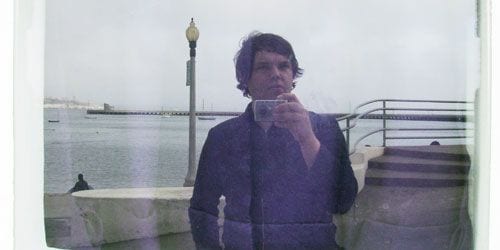
Jason Quever may be travelling backwards, but you can’t accuse him of standing still. The San Franciscan behind Papercuts has collected all-analog equipment, and is so resolute in his recreation of an “organic” sound you’d be forgiven for mistaking his nostalgia for some obtuse dedication to a lost, innocent ideal. There’s another way in which this retrograde journey is occurring. Can’t Go Back, Papercuts’ 2007 release, was all acoustic guitars and subtle hints that its protagonist was on top of indie affect, as well as quietly subversive production. That album’s triumph, “Dear Employee”, epitomised this. It’s flat-as-hell renunciation dressed up in mid-tempo ’60s AM twinkle.
Compared to on his previous work, Quever has rugged up and retreated. Instead of vocal-forward pop production, he’s cloaked and minimised his voice. Part of it might be the analog recording equipment, but he also sounds gentler, less forceful, in his delivery. From the opening strains of “Once We Walked in the Sunlight”, you’re aware of the organic sound, thick-textured and synesthetic. It’s part Beach House and part campfire, buoyant and rootless music. “The Machine Will Tell Us So”, languorous and sedate, rides its major scale bassline down, shuffling into the echoes and tremolo of some lost Blonde Redhead song.
But this music hardly sounds like a relic from the past. Perhaps it’s the post-drone, heavily layered sound that convinces us Quever is on top of modern indie’s intent. Shuttling seamlessly between compositions that hew close to verse-chorus and freer compositional styles, Papercuts never forces its explorations on the listener. Instead, he offers a velvet hand, and invites us along in such a way we can’t resist.
There’s a sense, in this subgenre of indie electropop that layers synth on synth to infinity, that atmosphere can overcome any songwriting limitation. That creating these dreamy soundscapes is enough. But it’s not, all the time, and that’s why when they’re not completely on, groups like the Postmarks seem merely pretty, little more. Papercuts mostly avoids this pitfall, not necessarily through the inventiveness of his compositional forms, but in variation of tempo and timbre. The upbeat tracks on You Can Have What You Want are easily among the most successful. “Future Primitive”, the single, rides a strong bass line over shuffling snares on its way to a chorus that’s pitched slightly too high so that it has that strained, amateur (in a good way) feeling of a Peter Bjorn and John song. Likewise, “Dictator’s Lament” chugs nicely along. It’s so cloaked in echoes you feel you’re listening in from the next room (perhaps as close as you’re going to get to hearing a dictator lament anything).
The album’s less immediate than Can’t Go Back, and this is actually one of the things that makes it, in the end, probably more lastingly entertaining. Sure, it’s easy to lose yourself in these floating, layered synths; but it takes some effort to deconstruct them fully. Not that you really need to – as Quever sings on the title track, “You can have what you want to / and throw the rest away.”

![Call for Papers: All Things Reconsidered [MUSIC] May-August 2024](https://www.popmatters.com/wp-content/uploads/2024/04/all-things-reconsidered-call-music-may-2024-720x380.jpg)



